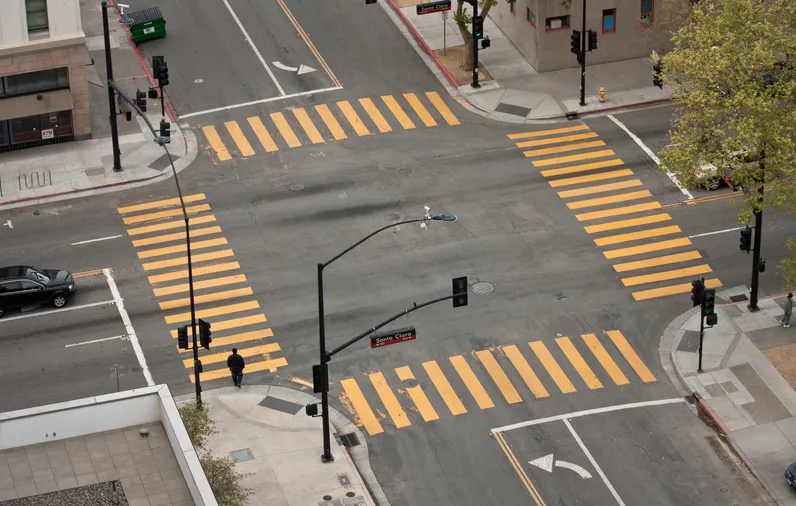Part of a larger urban zone, the city of Darmstadt near Frankfurt, Germany, does not escape the problems of traffic congestion. In a bid to improve the situation, the city’s traffic authorities have installed more than 200 video detectors from Flir Systems, along with Flir’s video management system, Flux, which monitors the traffic streams coming from a wide variety of cameras.
The city is also using various types of video sensors for vehicle, pedestrian and cycle detection, all of which are used to con
October 20, 2015
Read time: 3 mins
Part of a larger urban zone, the city of Darmstadt near Frankfurt, Germany, does not escape the problems of traffic congestion. In a bid to improve the situation, the city’s traffic authorities have installed more than 200 video detectors from 6778 Flir Systems, along with Flir’s video management system, Flux, which monitors the traffic streams coming from a wide variety of cameras.
The city is also using various types of video sensors for vehicle, pedestrian and cycle detection, all of which are used to control traffic flows in a more intelligent way. In some parts of the city, video detectors allow the traffic authorities to detect congestion so that if there is an increase in the flow of traffic, the green signal can be extended to allow the traffic jam to dissipate.
To guarantee the safety of pedestrians, Flir C-Walk sensors have been installed in some areas to detect large groups of people and to adapt the green phase of the traffic signal system accordingly, providing pedestrians with time to cross the street safely.
In order to detect the presence of cyclists and pedestrians at intersections, the city has installed the Flir ThermiCam, an integrated thermal camera and detector for vehicle and cycle detection which uses the thermal energy emitted by vehicles and cyclists to detect both over a long range, even in darkness and the most difficult weather conditions. The intelligent ThermiCam sensor will transmit its detection information over contact closures or IP to the traffic signal controller, allowing a more dynamic control of traffic signals.
All traffic data, events, alarms and video images generated by the Darmstadt video detectors are collected and managed by Flir’s intelligent Flux software platform, providing control room operators with up to date information for traffic management.
Stefan Hartmann, traffic engineer at the Darmstadt Traffic Administration comments: “Video detectors have proven to be very suitable for traffic-dependent control, especially when you take into account the wide variety of applications. With the video detection sensors from FLIR, we have been able to significantly improve the quality of traffic-dependent control as compared to the use of induction loops.”
Marko Mitsch, head of the Darmstadt Region at e-netz Südhessen, a partner for the planning, construction and operation of traffic signals in Darmstadt, comments: “Another benefit of using video detection is that we can use it for overall traffic monitoring. We can monitor road junctions in our traffic control room without being directly present on location. With loop systems, the intelligence resides outdoors, on site, but without remote access. Video systems on the other hand only need to be installed outdoors while operations and configuration are fully handled from here across our network.”
The city is also using various types of video sensors for vehicle, pedestrian and cycle detection, all of which are used to control traffic flows in a more intelligent way. In some parts of the city, video detectors allow the traffic authorities to detect congestion so that if there is an increase in the flow of traffic, the green signal can be extended to allow the traffic jam to dissipate.
To guarantee the safety of pedestrians, Flir C-Walk sensors have been installed in some areas to detect large groups of people and to adapt the green phase of the traffic signal system accordingly, providing pedestrians with time to cross the street safely.
In order to detect the presence of cyclists and pedestrians at intersections, the city has installed the Flir ThermiCam, an integrated thermal camera and detector for vehicle and cycle detection which uses the thermal energy emitted by vehicles and cyclists to detect both over a long range, even in darkness and the most difficult weather conditions. The intelligent ThermiCam sensor will transmit its detection information over contact closures or IP to the traffic signal controller, allowing a more dynamic control of traffic signals.
All traffic data, events, alarms and video images generated by the Darmstadt video detectors are collected and managed by Flir’s intelligent Flux software platform, providing control room operators with up to date information for traffic management.
Stefan Hartmann, traffic engineer at the Darmstadt Traffic Administration comments: “Video detectors have proven to be very suitable for traffic-dependent control, especially when you take into account the wide variety of applications. With the video detection sensors from FLIR, we have been able to significantly improve the quality of traffic-dependent control as compared to the use of induction loops.”
Marko Mitsch, head of the Darmstadt Region at e-netz Südhessen, a partner for the planning, construction and operation of traffic signals in Darmstadt, comments: “Another benefit of using video detection is that we can use it for overall traffic monitoring. We can monitor road junctions in our traffic control room without being directly present on location. With loop systems, the intelligence resides outdoors, on site, but without remote access. Video systems on the other hand only need to be installed outdoors while operations and configuration are fully handled from here across our network.”







